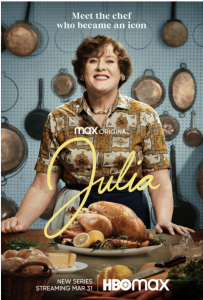‘Julia’ explores how her success enlightens women pondering “Is there all there is to life?”
Category: Television and Streaming
The 2009 film Julie & Julia revealed how the marriage of equals — Meryl Streep’s Julia Child and Stanley Tucci’s Paul — looked like, in spite of the well-ingrained traditional gender roles. They adored, respected and supported each other so graciously that they became my paragon of marriage I’ve never seen in my life.
Inspired by the extraordinary life of Julia Child, the HBO Max limited series Julia almost picks up where the film left off. The Childs are back in Cambridge in 1962; Paul (David Hyde Pierce) is retired and restless while Julia (Sarah Lancashire) is busy promoting her cookbook sensation, Mastering the Art of French Cooking. Little do they know that a radical shift in power dynamic would shake Paul to the core during his midlife crisis.
Although The French Chef at the emerging public television station WGBH eventually proves to be their long-running match made in heaven, this largely unknown, trailblazing Le Cordon Bleu graduate with a can-do spirit has to move heaven and earth to make her menopausal dream come true.
Needless to say, Julia is an object of ridicule of the sexist and elitist players at the station. She is not a WGBH material for many reasons; Who would watch a cooking demonstration by a large, middle-aged homemaker turned unpolished TV host? Are we desperate enough to bet on some clumsy dame named Julia Child?
Julia’s bumpy road to “feel and be relevant” —her emancipation and self-realization — begins when she sees an opportunity and negotiates her way into a driver’s seat for the first time in her life. With the unyielding support and help from her female friends — culinary book editor Avis DeVoto (Bebe Neuwirth), Knopf writer/editor Judith Jones (Fiona Glascott), WGBH-TV associate producer Alice Naman (Brittany Bradford), etc. —, Julia comes into her own during the early sixties when not only the role of women, but also other cultural paradigms are undergoing upheaval.
So is Julia’s midlife marriage, unfortunately. While Paul’s light is quickly dimming, Julia breaks free from the “golden cage” and fearlessly pursues her calling whether he likes it or not. She practically reinvents herself as a professional/business woman in her midlife transition and earns the national spotlight, but Paul turns into the most annoying backseat driver.
When the ideology of the housewife was enforced by every possible means to limit women’s ambitions and opportunities, Julia became the embodiment of the power and recognition many underestimated and unappreciated women craved. Through her outlet for passion and creative energy, she taught her bored/entrapped female viewers to find their passion that might lead to self-discovery, self-development, and social aspiration. Once you experience the high of masterly accomplishment no other never-ending and mind-numbing duties and obligations of the ‘good wife’ can attain, it would transform women’s reality and ambitions. Whether by design or accident, Julia modeled the idea of a modern, independent woman against all odds.
I wish I could tell Julia that things have changed drastically, but six decades later, we still have Phyllis Schlaflyesque ultra conservative women preaching the antiquated Mad Men values. Remember Rebekah Neumann in WeCrashed (Apple TV+)? She’s the grossly misguided WeWork co-founder who preached the employees that women must help men ‘manifesting their calling in life.’ Umm…we’re not doing that any more, lady! Didn’t you get the memo?
The first three episodes of Julia are streaming on HBO Max. A new episode will drop every Thursday for the remainder of season.
About the Author
Meg Mimura is a TV critic who actually watches shows zealously in search of thought-provoking and paradigm shifting human drama worth our precious time. She is a member of Television Critics Association. Follow her on Twitter.
COURTESY PHOTO
